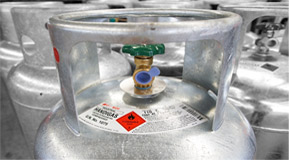

Basic Safety Rules for Cylinders
Ensure all equipment is connected correctly
Use a soapy water mix to check for leaks. Never use a match
Ensure all LPG equipment is in first class condition
Ensure your quantity of cylinders stored complies with local regulations
Always turn off valves when not in use
Always store cylinders upright
In case of a leak, move cylinders to a safe location
Store cylinders away from possible ignition points
Store cylinders away from excessive heat
Stored cylinders must not obstruct passageways or exits
Do not store cylinders in cellars, basements or confined spaces
Ensure all staff are trained on emergency procedures
During transportation, all cylinders must be adequately restrained.
Care of LPG Cylinders and Fittings
Every cylinder must be inspected by an authorised LPG test station at least once every 10 years. The last inspection date should be clearly stamped on the cylinder collar, neck or footing
If any leakage is detected or suspected from a cylinder, turn it off immediately and refer to emergency procedures
LPG cylinders (except specially designed forklift and automotive cylinders) must always be stored and transported in an upright position to comply with safety regulations
Cylinders should be stored in a well ventilated space and away from possible sources of ignition, excess heat or other compressed gases
Always secure cylinders during transport. Remove hoses, regulators and fittings and attach a sealing plug whenever the cylinder is not in use
Always shut off cylinder valve before disconnecting and ensure equipment is turned off fully before connecting new cylinder
The filling of any cylinder (other than automotive) from a service station bowser is an offence.
Use and Care of LPG Appliances
Installation and maintenance of LPG appliances must only be carried out by licensed or authorised LPG installers or service company
The installer is responsible to ensure that new or replacement appliances are connected, tested, adjusted and in safe working order. Appliance operating instructions should be handed to the consumer and explained by the installer
LPG appliances must not be connected to other gas supply systems, such as natural gas
Adequate ventilation must be provided to allow air for satisfactory combustion and ensure ample dispersal of the burnt gases. This is particularly important for unflued appliances
Installations in caravans, recreational vehicles and boats must comply with the installation code applicable to fixed appliances. Cylinder compartments must be sealed from the interior of vehicles/boats and vented to the outside. Cylinder valves must be closed when a caravan is in transit. Never use any gas appliance, including a refrigerator, in a moving vehicle
Turn off every LPG appliance in caravans/boats before refuelling
Do not use unflued LPG appliances under any circumstances in bedrooms, bathrooms or sleeping annexes.